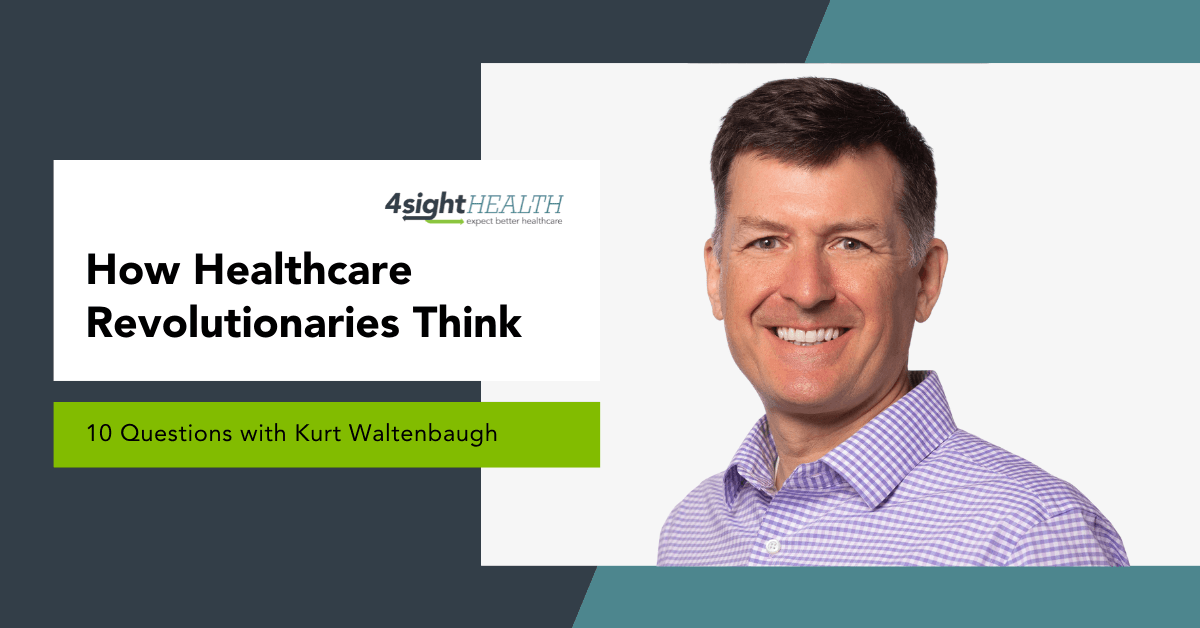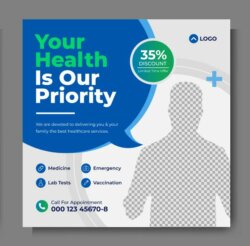May 18, 2021

How Healthcare Revolutionaries Think: 10 Questions with Kurt Waltenbaugh
Welcome to the fourth installment of 4sight Health’s monthly interview series, How Healthcare Revolutionaries Think. The interview series features healthcare instigators who believe that outcomes matter, customers count and value rules.
Healthcare is a business that doesn’t think it’s a business or act like it’s a business. A manifestation of that mindset is not knowing — and not really caring — how patients (if you’re a provider) or members (if you’re a health plan) behave. In other industries, patients and members are referred to as customers, and all successful businesses in those other industries care very deeply how their customers behave.
Carrot Health and its founder and CEO, Kurt Waltenbaugh, are on a mission to change that. Borrowing concepts from other industries, Carrot helps providers and payers collect and use data to understand, predict and engage patients in their own health. That skill set will become more important with the rise of healthcare consumerism, new market entrants into healthcare and the booming number of convenient and low-cost virtual care options in markets around the country.
We talked to Waltenbaugh about his journey and why he’s convinced that consumer analytics is the future of healthcare.
1. You refer to yourself as a serial entrepreneur. What’s your definition of a serial entrepreneur and why do you fit that description?
Waltenbaugh: A serial entrepreneur is someone who loves the process of creating, innovating, building and launching new companies. Then they do it again. And again. And again. Carrot is the fourth company that I’ve created or helped found over the past 30 years. I love the innovation and the creation, taking an idea from whiteboard to reality. That’s my passion.
2. As a serial entrepreneur, when do you know it’s time to move on to the next challenge? Do you wake up with a headache or something and say that’s it?
Waltenbaugh: Well, in a practical sense, it’s when you sell the company you created, and transition it to a new owner. In a more cerebral sense, it’s that moment when you stop being the evangelist for a new thing that you’re trying to introduce to the market and start the daily grind of trying to scale a business and eke out yet another percentage point in growth over the next quarter. Large, established and well-run businesses are good at that. They know how to make gains in efficiency, in profitability, in market share. They know that’s what they do, and they take your business and make it bigger and better. An entrepreneur is just the opposite. We like to throw spaghetti at the wall and see what sticks. It’s a fast and furious creative process. We don’t worry about efficiency or profitability or market share at all in the early going. Once that stops and the other begins, it’s a sign that it’s time for me to do something else. I’m not there now, because at Carrot we’re still developing all kinds of new things and defining the business.
3. You’ve worked in other industries like retail, manufacturing and education. What lessons did you learn there that you’ve applied to Carrot in healthcare?
Waltenbaugh: All the businesses I created or helped found in other industries use data to understand, predict or influence customer choice in some way. The classic example in retail is how a company uses data to understand or predict or influence what someone is going to buy next. You see it almost every time you buy something. “People who bought the same item you did, also bought this item.” The pop-up ads for things you just searched for online. Healthcare has a lot of data. Maybe more data than any other industry. But healthcare has a very poor understanding of its consumers and even worse doesn’t know how to use data to understand its consumers.
4. What you’re saying is healthcare needs to do what other industries have done, and that’s use data to understand, predict or influence customers, which we commonly call patients or members, right?
Waltenbaugh: Exactly. We thought, why can’t you apply that same approach to consumer behavior data in healthcare? You can. If you look at the data in patients’ clinical records or the data in members’ health insurance claims, you can predict clinical outcomes. You can predict future health risks. You can predict engagement rates. The data can take you down some pretty interesting paths.
5. What data down what path do you find particularly interesting right now in terms of predicting the behaviors of patients and members?
Waltenbaugh: I would say right now the most interesting path is social determinants of health. You can look at all kinds of consumer data on ZIP codes, grocery store purchases, housing and transportation costs, education levels, household income — most of which isn’t in medical records or insurance claims — and uncover all the barriers that keep people from being healthy in the first place. That consumer data helps explains what they do and don’t do, and how that affects their access to and use of the medical care they need.

6. Seems obvious to me from a business standpoint. What’s the reaction from healthcare executives when you pitch them on using data to understand their consumers better?
Waltenbaugh: To their credit, a lot of healthcare executives are coming around. But just a few years ago, a physician executive said to me, “I don’t need to understand my consumers. I don’t need to understand my patients. I don’t even want to call them consumers because they’re my patients, and they’ll do what I tell them to do.” A CEO of a hospital system said to me, “Why would I need to influence the consumer decision? I’m going to lock the consumers up by an employer contract or a payer contract, and they’ll have to come to my hospital. They won’t have a choice.” Can you imagine if a retailer did that? It’s an anathema to how consumers want a market to behave. If healthcare executives do that, they do it at their own peril and the peril of their organization.
7. You’re saying payers and providers largely have been insulated from competition and certainly not forced to think about consumer behavior and what consumers want. Is that changing and why?
Waltenbaugh: It is changing, and it’s changing for two reasons. First, consumers are expecting more and voicing what they expect out of the healthcare system. Second, you have market entrants that are ready to exploit that consumer dissatisfaction and take advantage of the opportunity with new business models. Ten years ago, a health system didn’t have to market directly to consumers other than doing a little branding because its market share rarely moved by a percentage point in any year. Today, largely upended by COVID and the shift to virtual care, patients have all kinds of options at all different price points. That legacy health system can’t charge the same $300 for a virtual visit it would for an in-person visit. Consumers would rebel and refuse to pay more than $45 for a virtual visit. So not only do you have to lower your price, you have to market directly to them and say why $45 is worth it.
8. So you can’t rely on your brand reputation to retain your market share or charge your traditionally high prices. How can data help you abandon that legacy approach and stay competitive?
Waltenbaugh: You have to take two views, one short term and one long term. Short term, you can use data to identify care that consumers need but aren’t getting because of SDOH barriers. Data can help you remove those barriers, reach those people and figure out how to engage them so they can get the care they need. Long term, it’s using data to change how we pay for healthcare. It’s figuring out a way to get those dollars upstream to fund things that prevent chronic diseases from occurring in the first place. I think that’s really the home run.
9. On a scale of 1 to 10, where are providers and payers in terms of using SDOH data in their decision-making processes?
Waltenbaugh: Providers are starting to capture that data as part of their patient intake. That’s helpful, but it only captures data from the subset of patients who are coming into your hospital or practice and on an infrequent basis. The ability of providers to use that data is still pretty low. Payers are in the same place. Lots of talk about it. Starting to capture and use that information. But as an industry, we’re barely scratching the surface. We’re probably at a three or four, hopefully on our way to an eight or nine out of 10.
10. Are there data sets other than SDOH data that providers and payers are blind to that they should be tapping to drive more value for consumers?
Waltenbaugh: That’s a good question, because SDOH is just one lens of consumer behavior. You really do have to look at the entire landscape of consumer analytics. Demographic. Behavioral. Social. Economic. Environmental. Financial. Experiential. Only then can you build a 360-degree view of an individual to, as I said earlier, understand, predict and influence that person’s behavior and then optimize your resources and your business models to improve their lives.
As we like to say at 4sight Health, customers count. Healthcare organizations that hope to stay relevant in the post-pandemic healthcare economy would be wise to adopt that credo and heed Waltenbaugh’s advice. We thank him for his candor and his insights.
Kurt Waltenbaugh, Carrot Health Founder and CEO

As founder and CEO of Carrot Health, Kurt Waltenbaugh heads up cloud-based healthcare consumer intelligence solutions that deliver real-time behavior insights for growth and population health.
Carrot MarketView™ provides actionable information for all constituents across the enterprise for data-driven decision making, from Strategy, Product, Marketing, Sales, Actuarial, Finance, and Population Health Departments to ensure a united view of the consumer, a “True North” to guide consumer-focused decision making across the organization.
Carrot measures the variation in consumer behavior to bring deep insights into consumer needs, health outcomes, and future health risk.
Read More Healthcare Revolutionary Interviews
- Gaurov Dayal, M.D. Everside Health, February, 2021
- Thompson Aderinkomi Nice Health March, 2021
- Jon Pearce Zipnosis
- Robert Pearl, MD (coming soon)





